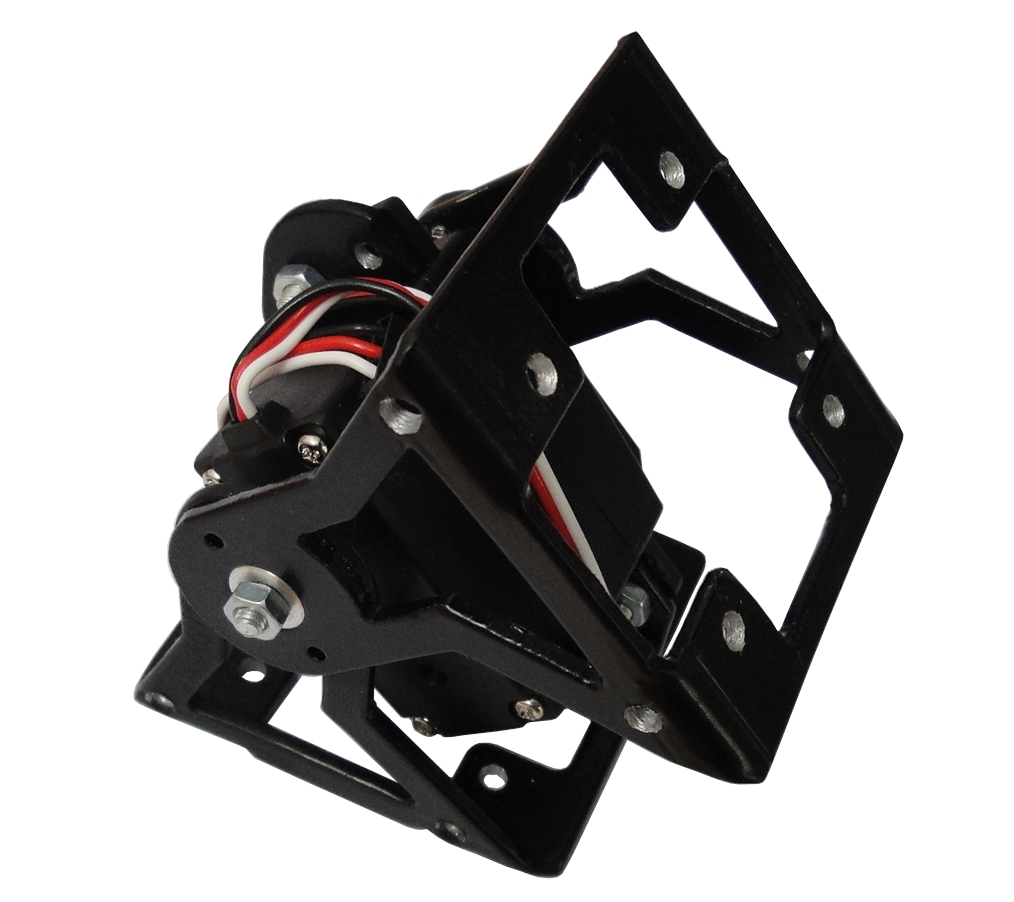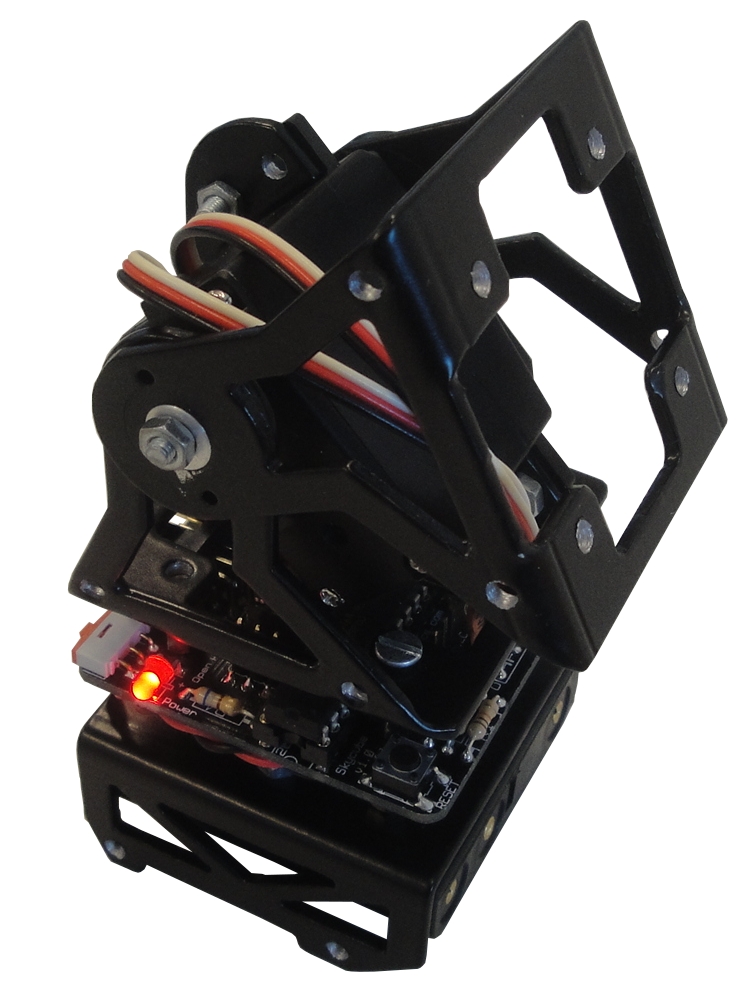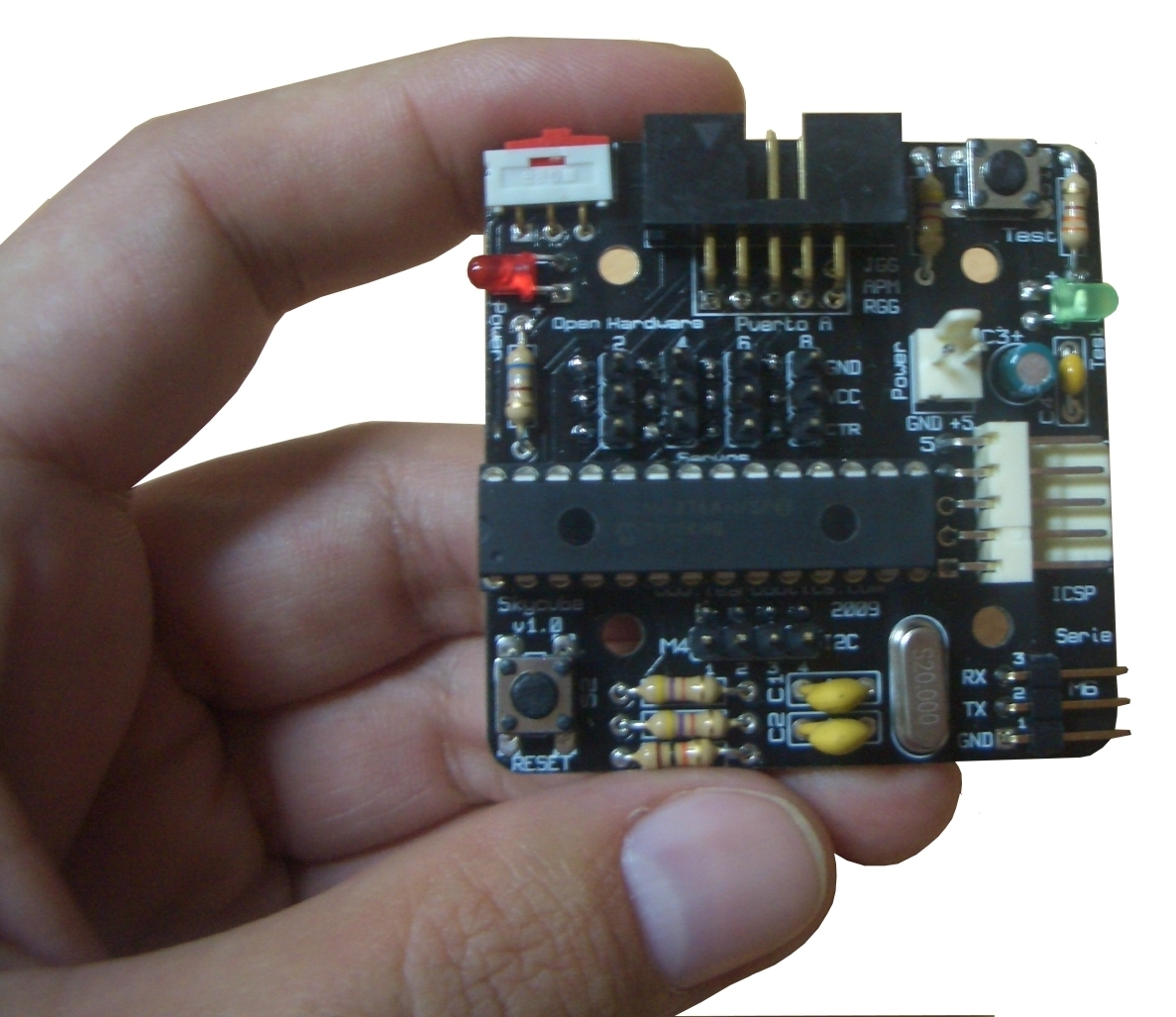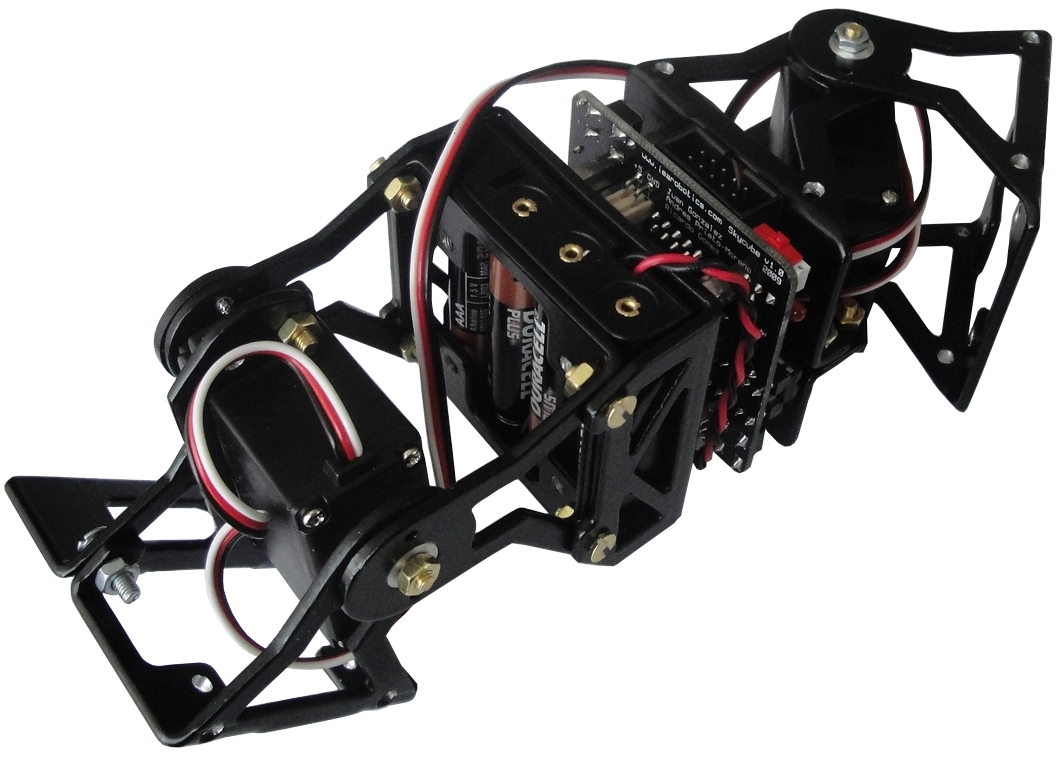
A 12 modules caterpillar robot (
click to enlarge)
Introduction
The last few years have witnessed an increasing interest in modular reconfigurable robotics. The applications include industrial inspection, urban search and rescue, space applications and military reconnaissance. They are also very interesting for research purposes. Modular robots are composed of some identical or similar units which can attach and detach each other and are capable of changing the configurations.
Some modular prototypes are quite famous, such as Polybot from Mark Yim, CONRO and SuperBot from Information Sciences Institute and Computer Science, M-TRAN robot from Kamimura. Some common ideas of these prototypes lie in two points. Normally this kind of robots consists of many modules which are able to change the way they are connected. In further the modular approach enables robots the reconfiguration capability which is very essential in such tasks which are difficult for a fixed-shape robot. It also enables the mobile robotic system the characteristics of versatility, robustness, low-cost and fast-prototyping so that new configurations of different robots can be built fast and easily, for the exploration, testing and analysis of new ideas. More exciting advantage is that the robots have the capability of adopting different locomotion to match various tasks and suit complex environments.
Robotics has emerged as a useful tool in education because robots provide ideas of science and technology. It connects the student with the science and technology easily. In this training program, we would like to use modular robots for educational purposes. the participators will work with educational robots and modular robots to learn the following aspects:
- Building modular mobile robots and simple kinematic chains
- Programming of elementary robot skills and behaviours
- Locomotion control based on bio-inspired methods
- Testing for cooperating tasks
We also hope that the participators could apply theory and model learned in the robotics related course to real robot systems so to gain experiences in working with physical sensors, actuators and robot programming.
All information here will be improved according to our new working experimence regularly.
Programme
Day 1
- * About ourselves.
- * Introduction to modular robotics(PDF)
- * Overview of the training on modular snake robots (As shown below)
- Session 2: Building the MY1 modules
- Assembling the MY1 modules. Mounting the battery pack. Preparing the download cable. Building Unimod A1
|
Day 2
- Session 3: Software installation
- Installing the SDCC C compiler. Installing and testing the Codeblocks IDE. Installing and testing the Pydownloader tool. Introduction to the Skycube board. More programming examples
- Session 4: Servo controlling
- Introduction to servo controlling. Programming the sevos. Introduction to the sinusoidal generators. Programming oscillations. Experiment 1: "The wave". Experiment 2: "The big wave"
|
Day 3
- First Challenge! Building a 30 modules caterpillar robot
- Session 5: Locomotion in 1D (I)
- Finish the 10 Unimods A1. Minicube-I assembling. Experiments on the locomotion of Minicube-I. Building the Cube3 configuration. Experiments on the locomotion of Cube3
- Session 6: Locomotion in 1D (II)
- Building the Cube6 configuration. Locomotion experiments. Building the Cube12 configuration. Locomotion experiments. Building the Cube30 configuration! Locomotion experiments. Locomotion principles. Introduction to the serpenoid curve
|
Day 4
- Second challenge! Building a 30-module snake!!
- Session 7: Locomotion in 2D (I)
- Building 10 Unimods B1. Building 10 Unidmods 2D-B1. Building 5 Minicube-II type A1. Building 5 Minicube-II type B1. Locomotion gaits. Locomotions experiments. Building a 6 modules pith-yaw configuration. Locomotion experiments
- Session 8: Locomotion in 2D (II)
- Building 3 snake9. Locomotion experiments. Building 1 snake18. Experiments. Building the snake30!. Locomotion experiments.
|
Day 5
- Session 9: Pending Experiments
- Pending tasks, resolve questions, complete the unfinished experiments
- Session 10: Conclusions and future work
|
Sessions
Session 1: Introduction
- About ourselves
- Introduction to modular robotics(PDF)
- Overview of the training on modular snake robots
|

|

|

|
Session 2: Building the MY1 modules
Session 3: Software installation and programming
Session 4: Servo controlling
- Introduction to servo controlling
- Programming the sevos
- Introduction to the sinusoidal generators
- Programming oscillations
- Experiment 1: "The wave". 10 Modules
- Experiment 2: "The big wave". 30 modules
|

|

|

|
Session 5: Locomotion in 1D (I)
|
Challenge 1! Towards a 30 modules caterpillar robot
|

|
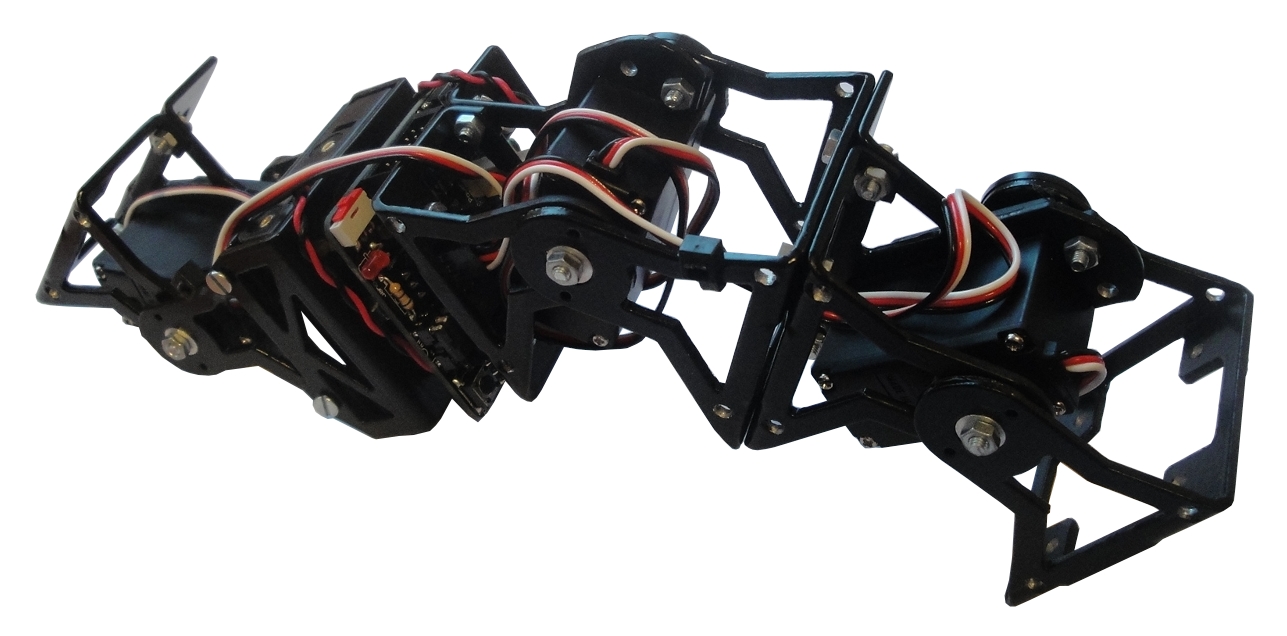
|
Session 6: Locomotion in 1D (II)
|
Challenge 1! Towards a 30 modules caterpillar robot
- Building the Cube6 configuration
- Locomotion experiments
- Building the Cube12 configuration
- Locomotion experiments
- Building the Cube30 configuration!
- Locomotion experiments
- Locomotion principles
- Introduction to the serpenoid curve
|

|

|
Session 7: Locomotion in 2D (I)
Session 8: Locomotion in 2D (II)
|
Challenge 2! Towards a 30 modules snake robot
- Building 3 snake9
- Locomotion experiments
- Building 1 snake18
- Experiments
- Building the snake30!
- Locomotion experiments
|
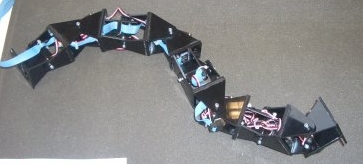
|

|
Session 9: Pending experiments
- Pending tasks
- Solve questions
- Complete the unfinished experiments
|
Session 10: Conclusions and future work
- Simulations
- Communications between the modules
- Sensors
- Neural networks
- Modular snake robot applications
- 2D topology configurations
|
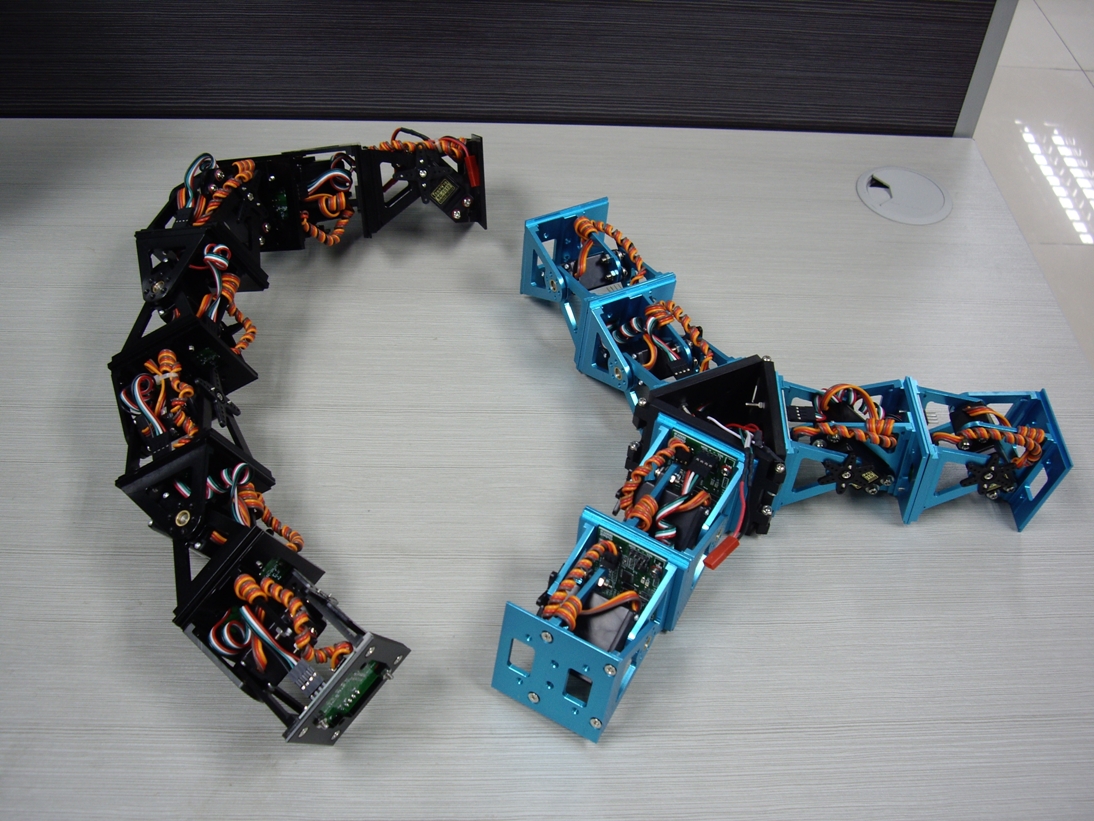
|
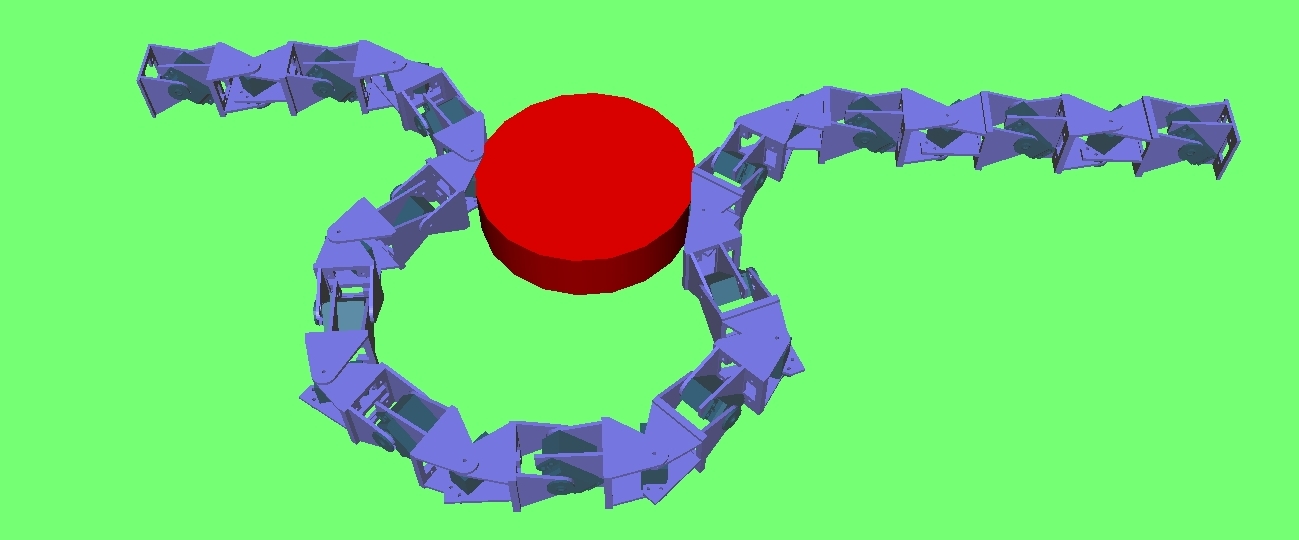
|
Repository
The latest version can be obtained typing:
svn co http://svn.iearobotics.com/MR_workshop/trunk
Authors
License
Links
Bibliography
- Juan Gonzalez-Gomez, "Modular Robotics and Locomotion: Application to Limbless robots". PhD dissertation. Universidad Autonoma de Madrid. Nov/2008. (More information)
- Juan Gonzalez-Gomez, Houxiang Zhang and Eduardo Boemo, "Locomotion Principles of 1D Topology Pitch and Pitch-Yaw-Connecting Modular Robots". Chapter 24 of the Book: Bioinspiration and Robotics: Walking and Climbing Robots, pp. 403-428. Published by Advanced Robotics Systems International and I-Tech Education and Publishing. Vienna, Austria. September 2007. (More Information)
- Juan Gonzalez-Gomez, Houxiang Zhang, Eduardo Boemo and Jianwei Zhang, "Locomotion Capabilities of a Modular Robot with Eight Pitch-Yaw-Connecting Modules",Proc. of the 9th International Conference on Climbing and Walking Robots. Clawar06, pp. 150-157. Brussels, September 2006. (More Information)
- Juan Gonzalez-Gomez and E. Boemo, "Motion of Minimal Configurations of a Modular Robot: Sinusoidal, Lateral Rolling and Lateral Shift", Proc. of the 8th International Conference on Climbing and Walking Robots. CLAWAR, pp. 667-674. London, September 2005. (More Information)
- Houxiang Zhang, Juan Gonzalez-Gomez, Zhizhu Xie, Sheng Cheng, Jianwei Zhang. " Development of a Low-cost Flexible Modular Robot GZ-I". Proceeding of 2008 IEEE/ASME International Conference on Advanced Intelligent Mechatronlics, pp. 223-228, Xi'an, China, 4 - 7 June. (PDF)
- Houxiang Zhang, Juan Gonzalez-Gomez, S.Y. Chen, Jianwei Zhang. "Embedded Intelligent Capability of a Modular Robotic System".Proceeding of IEEE Robio2008, Bangkok, Thailand, Dec. 2008. (PDF)
- Houxiang Zhang, Juan González-Gómez, Jianwei Zhang. "A New Application of Modular Robots on Analysis of Caterpillar-like Locomotion". Proceedings of the 2009 IEEE International Conference on Mechatronics, Malaga, Spain, 14-17 April. (More Information)
- G. Salvietti, H.X. Zhang, J. Gonzalez-Gomez, D. Prattichizzo, and J.W. Zhang. "Task Priority Grasping and Locomotion Control of Modular Robot". In Proc. IEEE Int. Conf. on Robotics and Biomimetics, Guilin, China, December 2009. (PDF)
- Juan Gonzalez-Gomez, Javier Gonzalez-quijano, Houxiang Zhang, Mohamed Abderrahim, "Toward the sense of touch in snake modular robots for search and rescue operations". In Proc of the ICRA 2010 workshop on modular robots: State of the art. pp. 63-68, May-3rd, Anchorage, Alaska. (PDF)
- Houxiang Zhang, Wei Wang, Juan Gonzalez-Gomez, Jianwei Zhang. "Design and Realization of a Novel Modular Climbing Caterpillar Using Low-frequency Vibrating Passive Suckers". Advanced Robotics. Volume 23, Numbers 7-8, 2009 , pp. 889-906.
- Houxiang Zhang, Wei Wang, Juan Gonzalez-Gomez and Jianwei Zhang (2010), "A bio-inspired small-sized wall-climbing caterpillar robot", Book chapter (1), Mechatronic Systems Applications, Annalisa Milella Donato Di Paola and Grazia Cicirelli (Ed.), ISBN: 978-953-307-040-7, InTech (PDF)
News
- Feb/19th/2011: This page is started



